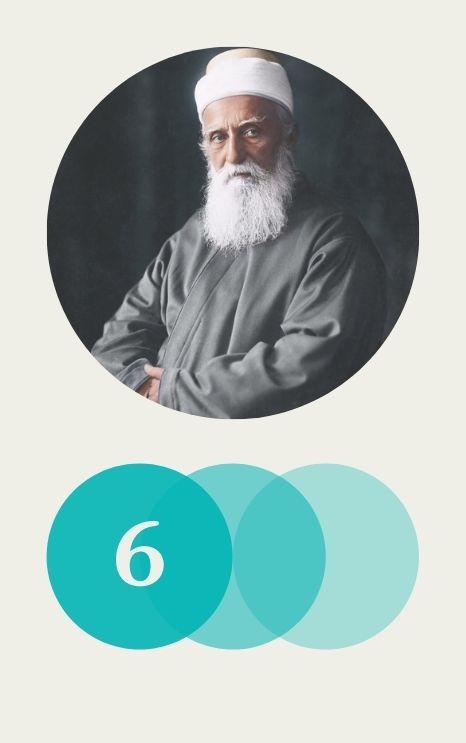The Bahá’í teachings espouse a vision of unity and harmony among humanity, underpinned by principles that transcend traditional divides. Within this framework, the podcast episode titled “Ambassador to Humanity – Episode Six: The Road to World Peace” examines the multifaceted journey toward global serenity. This exploration not only elucidates the ideals of peace but also beckons listeners to reassess their perspectives on communal existence and universal brotherhood.
At the heart of Bahá’í philosophy is the assertion that peace is both a personal and collective obligation. The teachings propose that the manifestation of world peace begins within the individual soul. This premise demands an introspective effort—transformation of the self—as a precondition for the broader societal shifts required to quell conflict and foster unity. The podcast episode delves into this critical dichotomy: the relationship between inner tranquility and outer harmony. By understanding ourselves, we are better equipped to relate to others, fostering an environment conducive to collaboration and compromise.
Listeners are urged to consider peace not merely as the absence of conflict but as the presence of justice, understanding, and acceptance. This nuanced interpretation challenges conventional assumptions, prompting an exploration of what true peace entails. The episode posits that for world peace to flourish, societal structures must evolve; systemic injustices must be confronted and eradicated. Accordingly, it explores strategies to deconstruct entrenched social hierarchies and advance equality—vital cornerstones in the edifice of lasting peace.
The podcast elegantly weaves anecdotes and theoretical discussions to elucidate these concepts. One particularly compelling narrative highlights historical figures whose lives epitomized the struggle for peace. Their journeys illustrate the myriad challenges faced and the resilience required to overcome them. Such examples serve not only as inspiration but also as pragmatic outlines for action. By examining failed efforts alongside successful initiatives, listeners glean valuable lessons about the complexities surrounding peacemaking efforts.
Furthermore, the episode interrogates the notion of “active peace.” This perspective challenges passive acceptance of conflict and encourages individuals to engage proactively in peace-building processes. It discusses the significance of grassroots movements and community engagement, underscoring the impact of collective action in heralding societal change. It emphasizes that every individual has a role to play, and that by joining forces, communities can effect significant transformations.
Another critical aspect the episode dissects is the global dimension of peace. The Bahá’í teachings advocate for universality—transcending national, ethnic, and cultural boundaries. The globalized nature of contemporary society, coupled with the challenges posed by climate change and technological advancement, underscores the necessity for a collaborative approach to peace. The discussion encourages listeners to consider their responsibilities not just within their immediate communities but in the context of the global community. This broadens the scope of their actions and underscores the interconnectedness of humanity.
Integral to this discussion is the concept of consultation—a vital tool for conflict resolution within Bahá’í practice. By fostering an atmosphere of mutual respect and open dialogue, consultation empowers individuals to express differing opinions while seeking consensus and harmony. The podcast elaborates on how to apply these principles in personal and communal settings, inviting listeners to engage in respectful discourse as a precursor to peaceful coexistence. This approach cultivates critical thinking and empathy, vital skills in navigating complexity and divergence within any society.
The episode further contemplatively addresses the educational dimensions of peace. It posits that instilling values of compassion, tolerance, and equity in future generations is paramount. Education serves as a conduit through which these principles can be disseminated, ensuring that they are not merely theoretical concepts but lived experiences that shape real-world interactions. The promotion of educational initiatives worldwide—accessible to all demographics—emerges as a key theme. By prioritizing education, society lays a robust foundation for informed, engaged citizens who are equipped to tackle contemporary global challenges.
As listeners absorb the teachings presented in this episode, it becomes elucidated that the journey toward world peace is not a solitary endeavor. It is a collective pilgrimage necessitating unity, collaboration, and a profound understanding of our shared humanity. The Bahá’í teachings articulate that every action, no matter how minute, has the potential to contribute to the overarching goal of peace. In this light, the podcast becomes more than a mere auditory experience; it transforms into a compelling call to action. Listeners are encouraged to internalize these teachings and embody the principles that empower change.
By the conclusion of this enlightening episode, participants are left with lingering questions and newfound insights that invite introspection and engagement. What does it mean to be an ambassador of humanity? How can one actively contribute to the realization of a peaceful world? The podcast culminates not in definitive answers but in a purposeful inquiry. This thoughtful dialogue creates a fertile ground for personal and communal evolution, ultimately illuminating the path toward a harmonious global existence driven by collective goodwill and courage.
In an era marked by discord and division, the teachings illuminated in the “Ambassador to Humanity – Episode Six: The Road to World Peace” resonate profoundly. They offer listeners the opportunity to pivot their perspectives and engage meaningfully in the multifaceted quest for peace. Armed with the insights from Bahá’í teachings, individuals are called to galvanize their efforts, fostering a culture of peace that reverberates across nations and transcends the limitations of our times.
